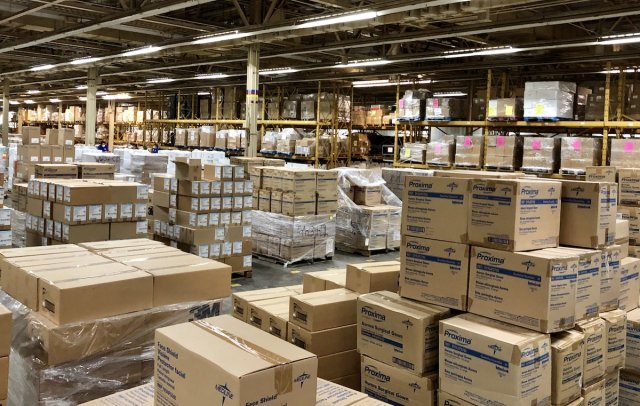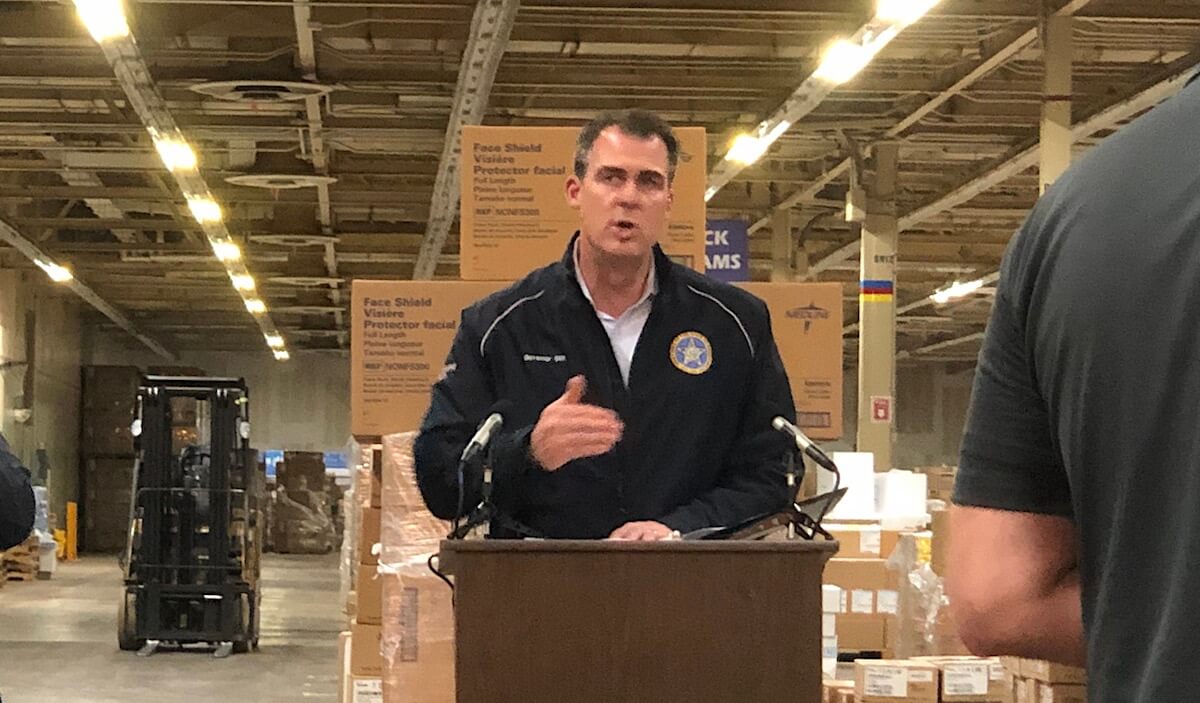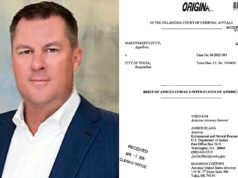
In response to rumors and reports that some Oklahoma health care workers have been asked by their employers to use or re-use personal protective equipment outside of federal guidelines, Gov. Kevin Stitt held a press conference today in front of the state’s PPE reserves to emphasize the availability of supplies for hospitals.
“We’ve heard about their lack of supply in certain hospitals. When I dig into it — number one we have a report from hospitals across the state every day,” Stitt said, stopping short of saying the claims turn out to be false. “Sometimes there are just communications issues, and that’s why I’m here. They can call my office.”
Stitt delivered his remarks from a warehouse in Oklahoma City. Media were asked to sign agreements saying they would not disclosure the warehouse’s location.
“If you are short on PPE or your hospital is asking you to preserve beyond the CDC guidelines, I need to hear about it,” Stitt said. “One of my number one goals is to protect our health care workers.”
Stitt spoke along with Gino DeMarco, whom the governor dubbed Oklahoma’s PPE “czar,” to discuss the PPE reserves. DeMarco listed estimates of the items behind him:
- 4 million pairs of gloves
- 120,000 gowns
- 173,000 face shields and goggles
- 900,000 surgical and medical masks
- 110,000 respirators
- A “variety of other” PPE
“In every one of those categories, we’ve got between one and five times more than that on order coming from around the world,” DeMarco said. “On a day-to-day basis, you see that build up and then go out.”
But DeMarco did confirm Oklahoma dealt with an early issue affecting many states’ PPE reserves: deteriorated gloves and elastic mask straps.
“I think there was some of that segregated in the warehouse, but we have purchased literally millions of dollars’ worth of equipment from all over the world,” DeMarco said. “We have plenty of stuff that is ready to go out as it is needed.”
Ventilator numbers up, but required medications to be watched

Stitt said Oklahoma’s total number of ventilators — about 2,000 — is higher than the estimated need from state epidemiological modeling, which is being updated after private laboratories reported their negative testing numbers. (Stitt said expectation of Oklahoma’s COVID-19 peak is being “pushed back to May” but has been “considerably flattened.”)
But Dr. David Chansolme from INTEGRIS Health confirmed that leaders are watching another potential national shortage related to ventilators: the sedatives needed to operate them.
“You’ve got to have a lot of medications that are involved in [use of a ventilator] to sedate the patient,” Chansolme said. “We have not seen a huge shortage yet on those things, although certainly distributors are shipping those to places that are of highest need.”
DeMarco said state engineers are also looking at how to retrofit equipment such as anesthesia ventilators and CPAP machines in case Oklahoma does face a shortage of standard ventilators. Such actions recently received federal approval.
“We are aggressively pursuing everything we are allowed to do,” he said.
Oklahoma death count climbs by 16
Earlier Tuesday, the Oklahoma State Department of Health announced that 16 more Oklahomans have died from COVID-19. The announcement marks the highest single-day death total yet for Oklahoma, which now features 67 casualties from the pandemic. Overall, 1,472 Oklahomans have been diagnosed with the virus, with 376 individuals hospitalized.
“As a father, a brother, a son, this is devastating news. My heart breaks for their families,” Stitt said. “But we all have to take this very, very seriously. Stay home if you can, limit your trips to essential businesses and only send one person out to do your grocery shopping if possible. I’m just asking you to close your network. Limit your exposure to new people or new environments.”
Watch the full press conference on PPE reserves





















